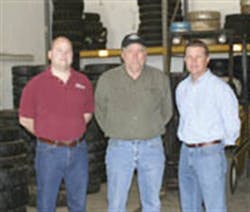Quality vs. quantity
In Bill Teeler’s book, quality trumps quantity. “Volume doesn’t mean a lot to us,” says the co-owner of Teeler Industrial Tire Inc. in San Antonio, Texas. “It’s what we make per job.”
Since it opened seven years ago, Teeler Industrial Tire has found plenty of ways to make good margins on its products and services.
The company sells forklift, skid steer and farm tires, among other tires, and also fills industrial and farm tires. Supplying tires to forklift and material handling equipment dealerships has proven to be particularly profitable.
“We have three portable presses and two stationary presses,” says Teeler, who runs the dealership with partners Gary Alcorn and Paul Spalla. (Teeler’s son, Aaron Teeler, was made a minority partner recently.) “We tow the presses behind our trucks. The weather here permits us to do that.”
Teeler Industrial Tire presses 15 to 20 tires for each customer per week, according to Teeler. Tire longevity “depends on how many hours the tire has been run and the operation of the machine.”
The company has two warehouses, “one for inventory and one where we perform tire work.” Each facility spans roughly 7,000 square feet.
The firm carries all popular forklift tire sizes, including what Teeler calls “heart-of-the-line sizes,” like 21x7x15 (“a really popular drive tire”), 7.00x12, and others. “We sell bigger stuff, too, like 12.00x20 solids.”
[PAGEBREAK]
Sourcing and pricing
Teeler Industrial Tire sells three forklift tire brands: Monarch, Continental and Globestar, which it added two years ago. The company buys the Sri Lankan-manufactured tires through a United States-based representative.
Globestar was not the firm’s first flirtation with Asian-made tires. “We needed to make a better profit margin,” says Teeler. “We weren’t making it buying from American manufacturers; it just wasn’t there. So we bought four containers from a Chinese manufacturer, but we were very unhappy with the quality of the product... warranties were impossible. We then hooked up with this Sri Lankan group.”
Teeler and his partners discovered that product quality and support from the Sri Lankan supplier were more than adequate. They now order eight or nine containers of Globestar tires per year. (Each container holds roughly 450 forklift tires.) The tires ship into Houston “and we get them within five days. In certain sizes, Globestar is all we carry.”
Teller Industrial Tire’s customers have been receptive to the Asian products, he says.
“They seem to wear just as well as original equipment tires.”
Tire life is of paramount importance to forklift equipment dealers. Price is a critical issue, as well.
Forklift tire profit margins have grown smaller over the years, according to Teeler, who adds that he and his partners are willing to work with customers who believe they need a lower price. It’s a concession they’re willing to make, he explains, in return for customer loyalty and future sales.
“If it’s a tight deal, they’ll let us know. If we can drop two percentage points, we will.”
This flexibility -- in addition to Teeler Industrial Tire’s reputation for service -- is reciprocated, says Teeler. The dealership has been able to pass along manufacturer price increases to customers, a common practice over the last few years.
Teeler Industrial Tire had a banner year in 2007 with $1.7 million in sales. It’s on track to achieve $2 million in sales this year.
“I’d put our little place up against anyone in the United States,” say Teeler.
[PAGEBREAK]
‘Recession-proof demand’ -- Industrial tires prove worth as consumable products
What’s the market like for industrial and specialty tires?
According to David Fleischhauer, Trelleborg Wheel Systems Americas’ director of marketing, the first two months of the year were slow for industrial tire sales, the same initial start as last year. “Overall, the economy is sluggish, and the costs for tire materials are high, including natural rubber and steel.”
Robin Holmes, business development for Bullman Products, says, “Sales are up over last year in spite of the fact that spending is scrutinized now more than ever.
“We see the current market for industrial tires and rubber tracks as a great opportunity. The word ‘recession’ has been kicked around a lot, but the thing to remember is that industrial tires and rubber tracks are a consumable. We show tire dealers how to differentiate themselves in the market by offering high-margin specialty tires and the complementing track loader and mini-excavator rubber tracks, which, in combination, satisfy the most pressing recession-proof demand of the compact equipment industry.”
Randy Tsai, Greenball Corp.’s director of GBC motorsports, says he feels customers are looking for a “cheap tire or a premium tire -- no middle ground.”
He also notes there is a lot of price pressure due to an increase in imports from what he termed “suitcase” companies — those with no actual U.S. base. “They have no infrastructure. They can disappear at any time, change their name and they’re back in buinsess.”
This pressure is especially acute in the trailer tire market “because it is so simple to be involved in... five or six sizes and two different load ratings pretty much cover the whole market.”
Despite the pricing pressure and high material costs, industrial and specialty tire manufacturers are thriving and moving forward with new products, such as the TR-900 radial industrial tire from Trelleborg and tires for the hot UTV (souped-up golf cars) market. These new products and more from Carlisle Tire & Wheel Co., American Pacific Industries Inc., Kenda USA and others will be highlighted in a future MTD.
